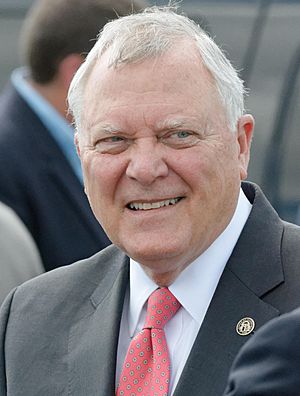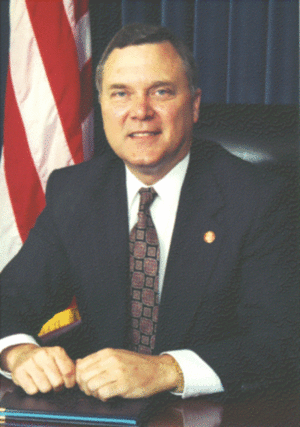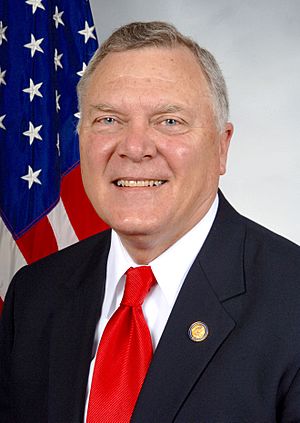Nathan Deal facts for kids
Quick facts for kids
Nathan Deal
|
|
|---|---|

Deal in 2017
|
|
| 82nd Governor of Georgia | |
| In office January 10, 2011 – January 14, 2019 |
|
| Lieutenant | Casey Cagle |
| Preceded by | Sonny Perdue |
| Succeeded by | Brian Kemp |
| Member of the U.S. House of Representatives from Georgia |
|
| In office January 3, 1993 – March 21, 2010 |
|
| Preceded by | Ed Jenkins |
| Succeeded by | Tom Graves |
| Constituency | 9th district (1993–2003) 10th district (2003–2007) 9th district (2007–2010) |
| Member of the Georgia State Senate from the 49th district |
|
| In office January 3, 1981 – January 3, 1993 |
|
| Preceded by | Howard Overby |
| Succeeded by | Jane Hemmer |
| Personal details | |
| Born |
John Nathan Deal
August 25, 1942 Millen, Georgia, U.S. |
| Political party | Republican (1995–present) |
| Other political affiliations |
Democratic (before 1995) |
| Spouses |
Sandra Dunagan
(m. 1966; died 2022)Brenda Micali
(m. 2025) |
| Children | 4 |
| Education | Mercer University (BA, JD) |
| Signature | |
| Military service | |
| Allegiance | |
| Branch/service | |
| Years of service | 1966–1968 |
| Rank | |
John Nathan Deal (born August 25, 1942) is an American politician and a former lawyer. He served as the 82nd governor of Georgia from 2011 to 2019. Before becoming governor, he was a member of the U.S. House of Representatives. He is a member of the Republican Party.
Deal was a member of the Georgia State Senate from 1981 to 1993. For his last two years there, he was the president pro tempore, a high-ranking position. In 2010, he ran for governor. He won a close primary election against Karen Handel. Then, in the main election, he defeated Democratic opponent Roy Barnes. He became governor in 2011, taking over from Sonny Perdue. Deal won re-election in 2014 against Jason Carter.
In 2014, Governor Deal signed the Safe Carry Protection Act into law. This law allows people with a permit to carry hidden weapons in many public places. These places include churches, school zones, and government buildings. Deal could not run for governor again in 2018 because of term limits. Brian Kemp became the next governor.
Contents
Early Life and Career
Nathan Deal was born on August 25, 1942, in Millen. He grew up on a farm in Sandersville, Georgia. His parents, Mary and Noah Jordan Deal, were both teachers.
He went to Mercer University in Macon. There, he earned his bachelor's degree and his law degree with honors. After getting his law degree in 1966, he joined the United States Army. He reached the rank of captain.
Deal worked as a private lawyer for 23 years. He also served as a criminal prosecutor. He was a judge in the Hall County juvenile court. Later, he became a judge in the Northeastern Judicial Circuit superior court. In 1980, he was elected to the Georgia State Senate as a Democrat.
In November 1990, his party chose him to be the President Pro Tempore. This is the second-highest position in the state Senate.
U.S. House of Representatives (1993–2010)
Joining Congress
Nathan Deal was first elected to the U.S. Congress in November 1992. He was a Democrat and took over from Ed Jenkins. He was re-elected as a Democrat in 1994.
However, on April 11, 1995, Deal joined the Republican Party. This happened shortly after Republicans gained control of the U.S. House for the first time in 40 years. The Speaker of the House at that time was Newt Gingrich, also from Georgia.
Deal was easily re-elected in 1996 as a Republican. This was the first time his district had elected a Republican for a full term since the Reconstruction.
Time in Congress
During his 17 years in Congress, Deal became an expert on health care policy. He became the chairman of the Health Subcommittee of Energy and Commerce.
Deal introduced a bill called the Citizenship Reform Act. This bill aimed to change how birthright citizenship works for children of undocumented immigrants.
Leaving Congress
On March 1, 2010, Nathan Deal resigned from his seat in Congress. He said he wanted to focus all his energy on his campaign for governor. Before leaving, he voted against the Patient Protection and Affordable Care Act, also known as Obamacare.
Governor of Georgia (2011–2019)
Running for Governor
The previous Republican Governor, Sonny Perdue, could not run again in 2010. Seven candidates ran in the Republican primary election. In July, no candidate won more than 50% of the votes. Karen Handel came in first, and Nathan Deal came in second. They then had a run-off election.
Deal was supported by former House Speaker Newt Gingrich. Handel was supported by former Alaska Governor Sarah Palin. On August 10, Deal won the run-off election by a very small number of votes.
In the general election, Deal faced former governor Roy Barnes, a Democrat. Deal won the election on November 3, 2010, with 53% of the votes.
Second Term as Governor
Deal ran for re-election in 2014. He won against two other Republican candidates in the primary. In the general election, he defeated Democratic State Senator Jason Carter. Deal won with 53% of the votes.

Key Actions as Governor
Supreme Court Expansion
As Governor, Deal added two more justices to the state's Supreme Court.
Immigration Laws
In 2011, Governor Deal signed Georgia HB 87 into law. This law gave the state more power to enforce laws about illegal immigration. It also required many employers to check if their new hires were undocumented immigrants.
Criminal Justice Reform

In 2011, Georgia faced a challenge with its criminal justice system. The number of people in prison had doubled in 20 years. Deal created the Georgia Criminal Justice Reform Council. This group looked at the system and suggested changes. These changes included more support for special courts and improving the juvenile justice system.
These reforms helped Georgia avoid needing 5,000 more prison beds. They also saved taxpayers a lot of money. A study in 2014 showed that prison sentences for African-American offenders dropped by 20%.
In 2013, Deal signed another law for criminal justice reform. This law helped people who earned money for college while in prison use it after their release. It also gave money to communities to offer other options instead of prison, like treatment programs.
Safe Carry Protection Act
In 2014, Deal signed House Bill (H.B.) 60, known as the Safe Carry Protection Act. Critics called it the "Guns Everywhere" Law. Deal said that gun rights are important to people in Georgia. This law allows licensed gun owners to carry guns in many public and private places. These include places of worship, school property, bars, and some government buildings.
The law was supported by many Baptist churches in Georgia. However, some Catholic and Episcopalian church leaders did not support it. By 2016, a survey found that while many Georgians felt guns protected people, most did not approve of the law itself.
Syrian Refugees
In 2015, Deal issued an order to stop state agencies from helping Syrian refugees settle in Georgia. This meant the state's Department of Human Resources would not process applications for food stamps from new Syrian refugees. Deal later canceled his order in 2016. This happened after Georgia's Attorney General said Deal did not have the power to issue it.
Religious Liberty Bill Veto
On March 28, 2016, Governor Deal vetoed a "religious liberty bill." This bill had been passed by the Georgia State Legislature. Many large companies, like Coca-Cola and Home Depot, had opposed the bill.
Campus Carry Bill
On May 3, 2016, Deal vetoed a bill that would have allowed guns on college campuses. He did this because state lawmakers did not include exceptions for places like child-care centers on campuses. A year later, on May 4, 2017, Deal signed a new, stricter version of the campus carry bill into law.
Nathan Deal was succeeded as governor by Brian Kemp on January 14, 2019.
Personal Life
Nathan Deal married Sandra Dunagan in 1966. They had four children together. Sandra Dunagan passed away in August 2022.
Deal married Brenda Micali in June 2025.
Honors
See also
 In Spanish: Nathan Deal para niños
In Spanish: Nathan Deal para niños
- Georgia gubernatorial election, 2010
- List of American politicians who switched parties in office
- List of United States representatives who switched parties
 | Stephanie Wilson |
 | Charles Bolden |
 | Ronald McNair |
 | Frederick D. Gregory |



